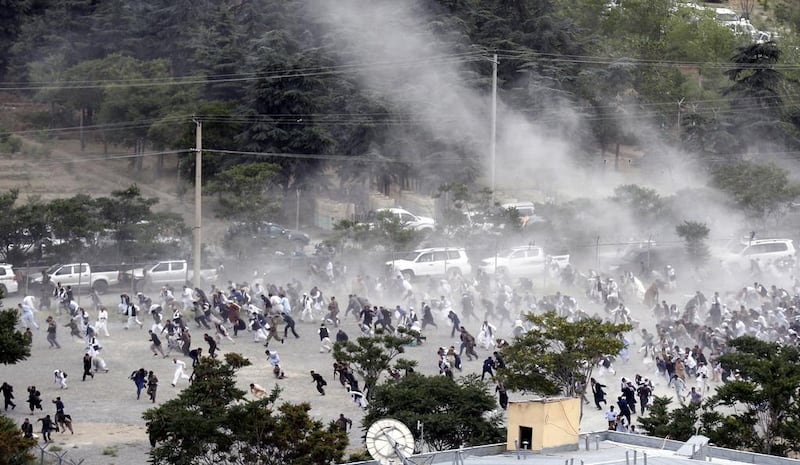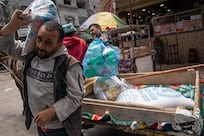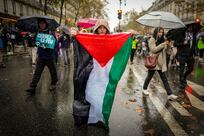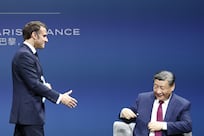On May 31, Kabul was terrorised once more. A lorry bomb exploded in the diplomatic area of the city. Nearly 100 people were killed and hundreds more were injured, many of them women and children, in a massive blast, the worst in a long time. The incident was followed by an attack at a funeral service on Saturday, which claimed the lives of several more people and injured dozens. No group or individual has taken responsibility for either heinous assault.
It’s unusual that no one has claimed credit for it. In fact, the Kandahar Taliban were quick to condemn it. More often than not, terrorists claim responsibility immediately. After all, that is their purpose: to terrorise.
And to lay claim to such a successful and heinous act would only elevate the claimants’ stature as successful terrorists. So, a disclaimer by one faction and no claimant to the event? That is odd.
As has become the norm of late, Kabul was quick to single out the Haqqani network as the prime suspect and added that they are supported across the border, in Pakistan, implying Pakistani collusion.
Pakistan denied the allegation and pointed out that the Haqqanis have not sought succour in Pakistan for some years, which is true. The Haqqani network is one group that is grounded in the area around Kabul. They are indeed capable of such an audacious venture but, before we consider who might be responsible, let us review Afghanistan’s current situation.
The Afghan Taliban were splintering even when Mullah Omar was alive. Since his death, however, the splintering has increased incrementally. Today, the number of Afghan Taliban groups, excluding the Haqqani network, is estimated at nine.
But there has also been an increase in ISIL's presence in Afghanistan. And most attacks in and around Kabul have been their handiwork.
The Haqqanis belong to the Zadran Pashtun tribe in Afghanistan and the bulk of this tribe is found in Paktia and Khost provinces, but a fair number reside in the neighbouring provinces of Nangarhar and Kunar.
Until the early 1990s, Jalaluddin Haqqani, the patriarch, whose son Siraj now leads the group, was an exclusive agent of the CIA. Haqqanis found support among their Wazir tribal cousins in Pakistan.
But, even if they are now based entirely in Afghanistan, an accusation based on historical truths, however outdated, seems plausible to some and it serves as an excuse for the Kabul government’s and US troops’ failings.
Sirajuddin Haqqani is a bold, audacious and imaginative leader. However, like his father, he is at war with “occupation forces” in Afghanistan and its “puppets”. In his view, the current government, like Hamid Karzai’s before it, is a US puppet.
Being a loyalist Afghan, however, implies he does not like “collateral damage”. The Haqqani attacks are, therefore, characterised by the fact that they target security forces, their installations or the Afghan government. For this reason, Haqqanis have never failed to claim their attacks, not to my knowledge.
It is very possible that one of their attacks was botched and caused the death of innocents. But the target should invariably have been one of the above. These attacks clearly targeted those whom Haqqanis consider “non-combatants”; which is clearly uncharacteristic for them. And Pakistan?
Pakistan’s Afghan policy was clearly flawed. But, after Pervez Musharraf stepped down from the presidency in 2008, the general headquarters of the Pakistan army was very clear. The future of Afghanistan was in Afghan hands – theirs to decide, theirs to own and implement. Moreover, both headquarters and the government are fully conscious that a peaceful and stable Afghanistan is in Pakistan’s interest.
The Afghan Taliban did indeed once find favour in Pakistan. But, for almost a decade now, the shoe has been on the other foot. Pakistani Taliban are hosted there and carry out attacks on Pakistani soil.
The Pakistan army has spent a long time trying to make Kabul realise this policy. Pakistan’s military has bent over backward attempting to establish this fact but with little success.
All aggression over this decade has been of Afghan origin. Pakistan has retaliated; never initiated. And even after each retaliation, it has again reached out the hand of friendship.
So who is responsible for these dastardly, heinous and demonic attacks?
I don’t know. But I can venture to say that it is so uncharacteristic of Haqqani network attacks that I will need irrefutable evidence to accept this accusation.
And, I can state the last bit unequivocally: whoever is guilty was no friend of Pakistan.
Take your pick. Due to its own past errors, Pakistan has many countries and individuals who are enemies of the state.
Brig Shaukat Qadir is a retired Pakistani infantry officer





